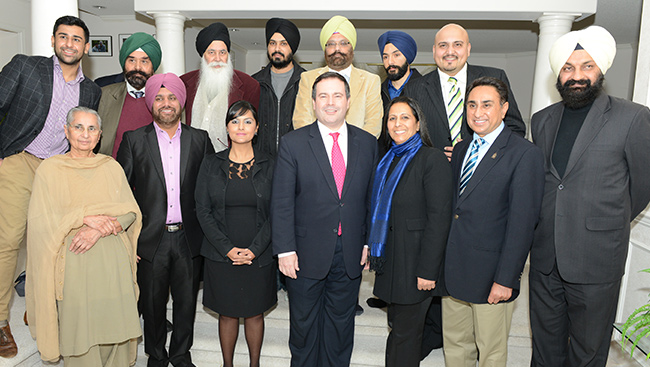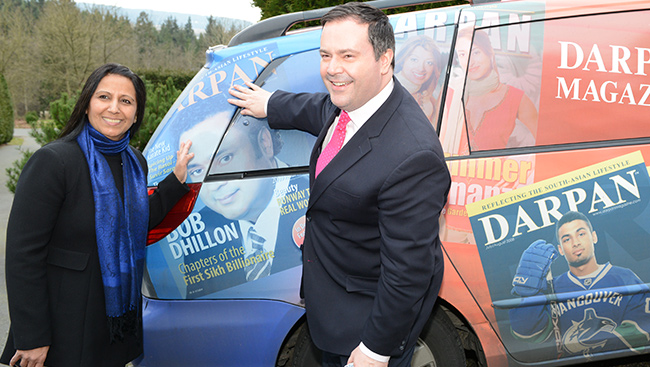In an Exclusive interview, DARPAN sat down with the Immigration Minister to gain insight and his perspective on Canada’s current and future immigration system
Known as one of the most powerful men in Canada, Jason Kenny, the Minister of Citizenship, Immigration and Multiculturalism has been an integral member of Prime Minister Stephen Harper’s Cabinet and is redefining Canada’s immigration policy. According to public perception and media experts, he is also a likely contender to lead the Conservative Party and perhaps, fill the role of Prime Minister one day.

Alex Castonguay, chief political reporter for L’actualité (sister publication to Maclean’s in Quebec), travelled with Kenney and had the following to say: “His methods are old school, far removed from social networks, where human contact, proximity and the fight for values undertaken by the Conservative party have gradually won over a large number of new Canadians. In the halls of government, it is plainly acknowledged: Kenney is the architect of the Conservative majority, having worked discreetly, yet tirelessly, for the past five years to build bridges with Canada’s ethnic communities.”
Getting back to current reality, I had the opportunity to exclusively interview Minister Kenney when he flew in to Surrey from Ottawa. I wanted to explore Castonguay’s statement with him further, and asked him ‘Why has it been important for you and the Tories to build bridges and garner support from ethnic communities across the nation?’
Without hesitation, he responded “Because it is country of immigration and any party that wants to have a governing coalition must reflect and include the diversity of the country and because for me, politics is about values, the most honest kind of politics is a system in which people vote for the parties and candidates that most closely reflect their values.”
He goes on to say he is “convinced that the values of most newcomers to Canada are essentially conservative values.” He cites a number of values from hard work, personal responsibility and devotion to family to tradition, religious faith and belief in democratic values in our foreign policy – which characterize the values of most new Canadians, who are the “hardest working Canadians,” he adds.
Kenney also makes reference to the fact that about 42 per cent of immigrants to Canada voted for the Conservative Party in the last federal election. “We won a higher share of the vote of new Canadians then we did with people born in Canada, which is phenomenal really, and we also have the most ethnically diverse caucus in the history of Parliament and I think this is good for Canada that we have people voting their values.”

He was beaming from a recent trip to India in January, where he travelled through five of the nation’s regions – Kerala, Goa, Punjab, Gujarat and Delhi. While in Amritsar, Kenney announced that CIC’s
Chandigarh office had issued a record number of visas, to be exact 17,608 Temporary Resident Visas to Punjabi visitors to Canada in 2012. In addition, Canada is working with Punjab State officials to combat illegal activities, such as immigration fraud and crooked immigration consultants. Kenney also met with Punjab State Minister Bikram Majithia and commended the state’s efforts and implementation of the new Anti-Human Smuggling Act.
Our conversation turned to the Super Visa program and if the freeze, which took place about a year ago, has been successful in reducing the backlog. Kenney said the freeze has been successful and was originally implemented because the wait times for sponsoring parents or grandparents was taking eight or more years, as the government would receive about 50,000 applications a year for only 15,000 to 20,000 available spots. This resulted in 180,000 parents or grandparents waiting 8-9 years and the problem was getting worse each year, he says.
“That is where we brought in the two-year temporary pause on new applications and we have also increased by 60 per cent the number of sponsor parents, who we are admitting permanent residence to Canada. So last year, I can tell you this is a kind of a scoop, we issued visas to 32,000 sponsored parents to come in as permanent residence and between 2012-2013, we’ll be admitting around 50,000 permanent residence as sponsored parents between those two years.
So when we re-open the parental sponsorship program for new applications at the beginning of 2014, the backlog and the wait times will be cut in half. The backlog would have gone from about 180,000 people to about 90,000 and the wait times would have gone from about 8 years to about 3-4 years when we re-open for new applications in addition to which we have the super visa,” Kenney concludes.
I wanted to discuss topics that had been making recent headlines and putting Kenney in the ‘spotlight.’ First on my list was the influx of temporary foreign workers. Last year, the program allowed about 200,000 workers into Canada and many Canadians felt that temporary foreign workers were resulting in lower wages and reduced employment opportunities for Canadians.
Kenney started off by saying “that is not happening” and clarified that about 185,000 temporary foreign workers came into Canada last year, and about 50,000 of them were working in holiday programs, for example young Australians working in Whistler or those on short term visits to Canada “so they are not taking jobs away from Canadians and the vast majority of temporary foreign workers can only come to Canada if their employer has obtained what is called a ‘labour market opinion,’ which verifies that they have offered the position to Canadians at the prevailing Canadian wage rate and that no qualified Canadians have applied.”
He went on to state that “Canadians come first” and the government is reviewing the program to ensure that procedures in place are fair and efficient, however he does say the Canadian economy has numerous “unfilled jobs that Canadians are not applying for and not prepared to do.” In such cases, the government will turn to the temporary foreign workers program, which is “a last resort.”
Kenney was adamant in clarifying his final point that temporary foreign workers are not allowed to be paid less than Canadians, and have to be paid at or above what Canadians are paid. “There has been some misunderstanding on this based on a recent rule that said some temporary workers could be paid, higher skilled ones, could be paid 15 per cent less than the average Canadian wage rate as long as Canadians are getting paid less than the average.”
“Am sorry for going into too much complexity on this, but obviously for every job there is a range, there is a scale. The prevailing wage rate for temporary workers was in the middle of the scale but obviously many newly hired Canadian workers were at the entry level wage. So what we are doing is allowing employers to pay a little bit less, 15 per cent less than the average wage as long as Canadians are getting paid at that lower level too, so that was misunderstood,” he explains.
For the last five years, the CIC has been developing an online tool, Expression of Interest, in which skilled workers can fill out a form with their credentials and in turn, the federal or provincial governments and potential employers can source individuals they need from this resource. According to Kenney, “our research” indicates that immigrants who arrive to Canada with pre-arranged employment will make twice as much as those who arrive without pre-arranged employment, therefore the new tool strives to match perspective immigrants with Canadian employers, who may be in need of their specialization.
Kenney referred to the tool as a “dating site,” and he was blasted by some media outlets for doing so. I asked him ‘Why did you make this reference?’ He chuckled and responded with the following:
“So the new immigration system will be designed as much as possible to match employers looking for workers who can’t find Canadians with perspective immigrants and we can use technology to do that worldwide and efficiently. You couldn’t do that in the old paper-based world but that is where the dating site metaphor comes in because in the new system people interested in immigrating to Canada will make out an initial application online from their countries of origin and then employers will be able to go online and search that pool of perspective immigrants.
Let’s say a BC company needs engineers with a particular specialization. They would be able to go into that pool, do a query, pull them out, do the interviews and if then if they like what they see, invite them to come to Canada. That is why I say it is like a dating site because it matches people based on their compatibility, potential immigrants to potential employers, so that the immigrants who come here have already got jobs lined up and they can go to work at their skill level fully realizing their potential and contributing productively to the economy rather than showing up, getting dropped into the general labour market to sink or swim, often ending up driving a cab or working in a corner store. That doesn’t work for them or Canada so the dating matching idea is central to the new immigration system.”
The Tories’ Bill C-43 titled ‘Faster Removal of Foreign Criminal Act,’ which would make it easier to deport refugees, permanent residents and visitors, is being criticized by politicians and media on the grounds that “it will end up targeting Canadian permanent residents and new immigrants, communities not shown to engage in any more criminality than Canadian citizens.” I wanted to talk further with the Minister to gain his perspective about this, and he said the bill is not about targeting permanent residents, but rather focuses on targeting serious criminals, who are not Canadians.
He went on to say he was approached by immigrant communities, who were frustrated with foreign criminals being allowed to stay in Canada with delayed deportation and a number of appeals. As he has said publicly a number of times, he reiterated the point that having permanent residency in Canada is a privilege that should not be abused, especially by committing a serious crime that “carries a penal sentence of six months or more, it seems to me that you should have due process in the criminal justice system for your criminal conviction, but after that you should go back to your country of origin.”
“We have had hundreds of serious convicted foreign criminals delay their deportation for years often going out and committing new crimes and creating new victims in Canada. So what I am saying is our first obligation is to keep Canadian streets safe and I believe that new Canadians permanent residents overwhelmingly support this initiative.”
With my last few minutes with Minister Kenney, I wanted to ask him a few personal questions. ‘Everyone sees you as this tough figure on immigration, I want to reveal a different side of you, so what would you say to individuals abroad who want to immigrate to Canada and live the dream?’

“The good news is that our new fast and flexible immigration system will make it much easier and faster for those who want to come and live the Canadian dream,” he said before launching into a story. In 2009, he met a brilliant young graduate from the Indian Institute of Technology in Bangalore and told him ‘We would love to have you in Canada,’ to which the student replied ‘What would it take?’ He realized the graduate would have to apply to the federal skilled worker program and get in the back of an 8-year long queue, so when he divulged this information to the student, he seemed taken back and told Kenney that many of his friends had already immigrated to Australia and New Zealand, and it only took a few months.
“I suddenly realized that our system had become dysfunctional for people like that, for many of the world’s best and brightest. So the message of the new system is that we want you! We have accepted more immigrants than ever before, and the new system will move much more quickly and it will do a much better job of attracting economic immigrants who have the skills to work at their skill level upon arrival.
I am sick and tired of seeing newcomers arriving here and wasting their potential being underemployed, stuck in survival jobs, leaving the top of their society their country of origin only to feel like they are being exploited to the bottom of Canada’s labour market. That is immoral that we should allow this to happen for so long and I see it as a moral cause trying to restore Canada as a true land of opportunity. I just don’t think it is acceptable any longer for us to take doctors, engineers and highly trained professionals from their countries of origin and have them driving cabs and working in night security positions. So the new system is about inviting those people who are going to be able to work at their skill level, realize their potential and feel like they are getting a shot in Canada so I am very excited about it.”
Before we wrapped up the interview, I had time to ask Minister Kenny one quick question – ‘Are you going to ever run for Prime Minister?’ He smiled and responded with “We have a great one right now – I’m focused on my job.”
Although some may not agree with Minister Kenney’s tactics or strategies on immigration and citizenship, it is hard to deny that his hard work to build bridges with ethnic communities, especially new immigrants, has paid off. With the Tories attempting to streamline the immigration system for efficiency, less delays and upholding the rich traditions of a multicultural society within Canada, it will be interesting to see how CIC and Minister Kenney’s immigration plans and strategies pan out over the next few years.



